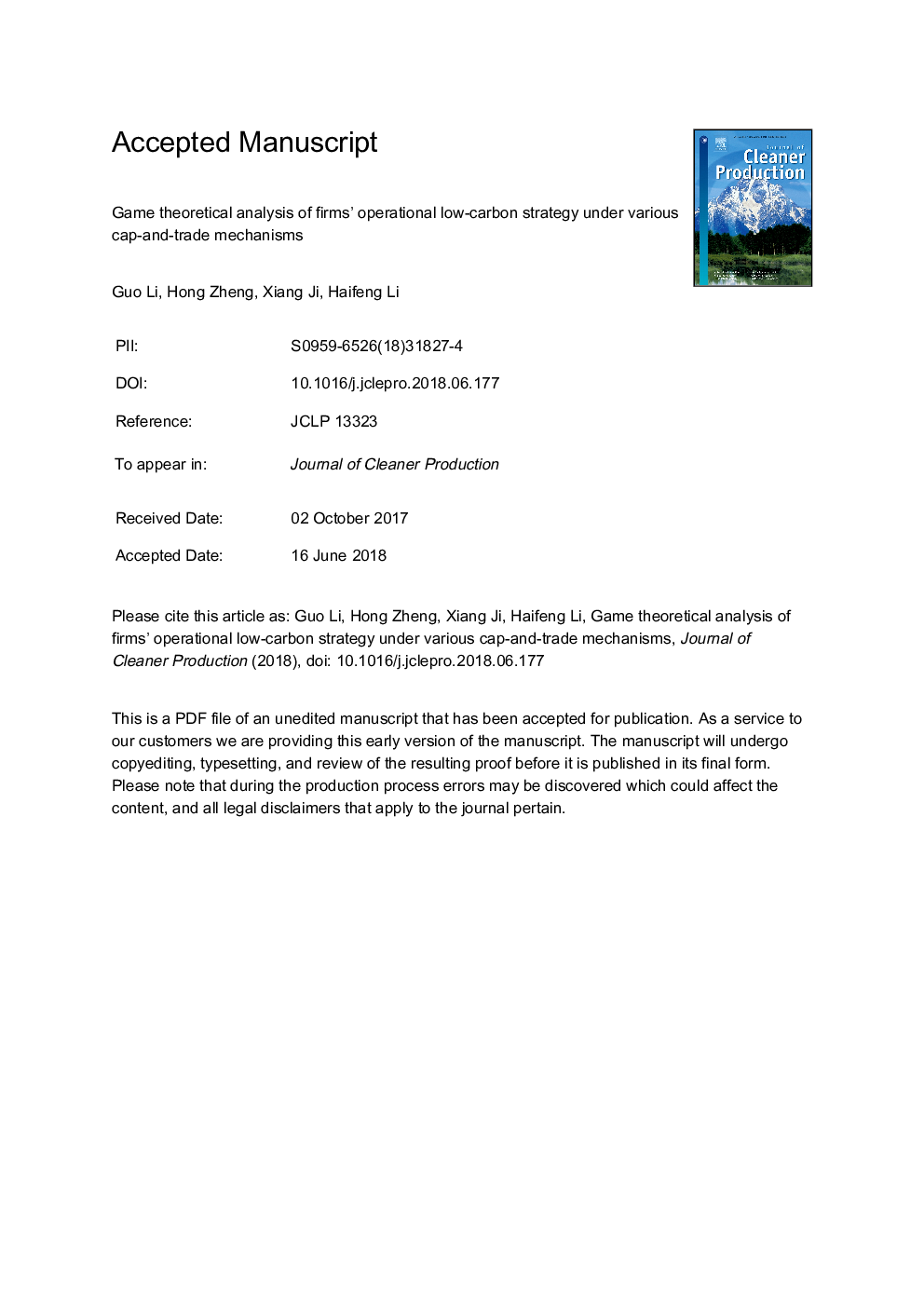| کد مقاله | کد نشریه | سال انتشار | مقاله انگلیسی | نسخه تمام متن |
|---|---|---|---|---|
| 8093721 | 1522056 | 2018 | 36 صفحه PDF | دانلود رایگان |
عنوان انگلیسی مقاله ISI
Game theoretical analysis of firms' operational low-carbon strategy under various cap-and-trade mechanisms
ترجمه فارسی عنوان
بازی نظری تجزیه و تحلیل استراتژیک کم کربن شرکت ها تحت مکانیزم های مختلف خرید و فروش
دانلود مقاله + سفارش ترجمه
دانلود مقاله ISI انگلیسی
رایگان برای ایرانیان
کلمات کلیدی
رفاه اجتماعی، مصرف انرژی پایدار، نظریه بازی، بسته و تجارت،
ترجمه چکیده
دولت ها معمولا از مقررات انتشار کربن مختلف برای اطمینان از مصرف انرژی پایدار شرکت ها و در نتیجه بهبود کل رفاه اجتماعی استفاده می کنند. در این مطالعه، ما یک مدل نظری بازی برای تجزیه و تحلیل نحوه تصمیم گیری های عملیاتی تولید کننده در مورد مصرف انرژی پایدار و تولید کم کربن با تغییرات در سیاست های رسمی تعرفه و تجارت تغییر می دهیم. نتایج به دولت کمک های تحلیلی را در تصمیم گیری های واقعی در جهان ارائه می دهد. یافته های ما نشان می دهد که سازنده می تواند انگیزه های بیشتری برای ارتقاء فن آوری تصفیه خود را در یک بازار ترجیحی با کربن کم در مقایسه با آنچه در یک بازار پایین تر از کربن است. علاوه بر این، دولت باید سیاست سرپوشیده و تجاری را محدود کند و سازنده را تشویق کند که تکنولوژی تصفیه آن را ارتقا دهد زمانی که مقررات مصرف کم کربن نسبتا بالا باشد. این یافته های تحقیق نشان می دهد هنگامی که مصرف کنندگان سطح بالای ترجیحی کربن کمتری را نشان می دهند، تولید کننده باید تصمیمات بهینه ای را برای عملیات خود انتخاب کند. هنگامی که مصرف کنندگان یک سطح مقطع ترجیحی کم کربن را نشان می دهند، اختلاف قابل توجهی بین بهینه سازی رفاه اجتماعی و ارتقاء فن آوری تصفیه رخ می دهد. بنابراین، اگر یک ارتقاء فناوری ضروری باشد، ارتقاء مبتنی بر سیاست برای افزایش سطح ترجیحات مصرف کنندگان کم کربن، یک عامل ضروری برای به حداکثر رساندن کل رفاه اجتماعی است.
موضوعات مرتبط
مهندسی و علوم پایه
مهندسی انرژی
انرژی های تجدید پذیر، توسعه پایدار و محیط زیست
چکیده انگلیسی
Governments commonly utilize various carbon emission regulations to ensure the sustainable energy consumption of firms and consequently improve the total social welfare. In this study, we apply a game theoretical model to analyze how a manufacturer's operational decisions on sustainable energy consumption and low-carbon production will be changed with the variation in official cap-and-trade policies. Results will provide the government with analytical supplements in making real-world decisions. Our findings show that the manufacturer can obtain increased incentives to upgrade its purification technology in a high low-carbon preference market compared with that in a low low-carbon preference market. Furthermore, the government should constrain the cap-and-trade policy and encourage the manufacturer to upgrade its purification technology when the consumers' low-carbon preference is relatively high. These research findings reveal that when consumers show a high low-carbon preference level, the manufacturer should make socially optimal decisions for its operations. When consumers show a moderate low-carbon preference level, a significant conflict occurs between social welfare optimization and purification technology upgrade. Thus, if a technology upgrade is necessary, then policy-based promotion to increase the consumers' low-carbon preference level is an essential factor to maximize the total social welfare.
ناشر
Database: Elsevier - ScienceDirect (ساینس دایرکت)
Journal: Journal of Cleaner Production - Volume 197, Part 1, 1 October 2018, Pages 124-133
Journal: Journal of Cleaner Production - Volume 197, Part 1, 1 October 2018, Pages 124-133
نویسندگان
Guo Li, Hong Zheng, Xiang Ji, Haifeng Li,
